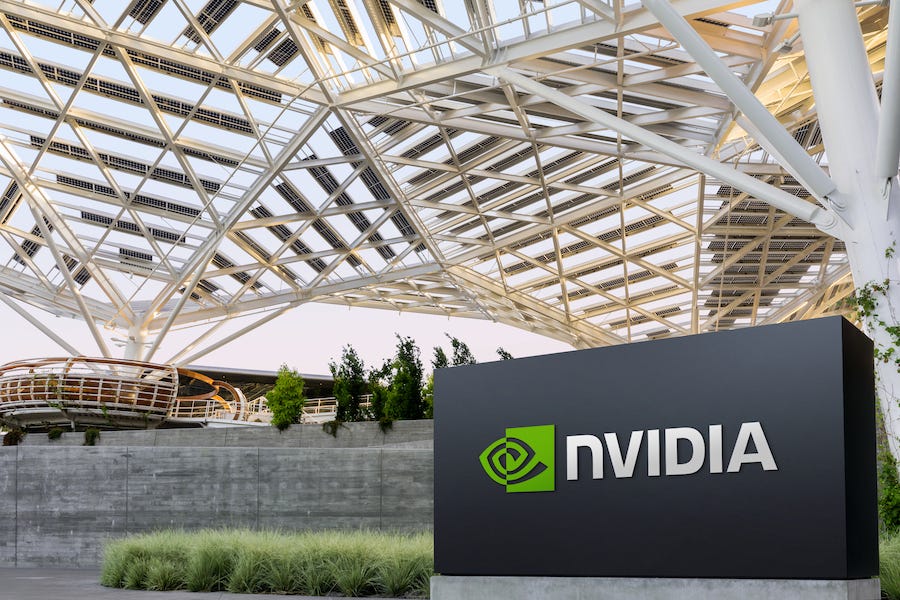NVIDIA's High Margins Eyed by a Coalition of Competitors and Customers
Competition and value chain power
A favored aphorism of Amazon founder Jeff Bezos is “Your Margin is my opportunity.” Om Malik suggests that Bezos said this directly to another CEO. This is a well-known concept in classical economics.
Whenever a firm earns returns above its marginal cost, competitors have an opportunity to come in and undercut their pricing. In commodity markets, this approach is almost a certainty. In other markets, it is not always clear where excess margins are being created.
When it comes to GPUs and the market that can now be called AI chips—or AI accelerated computing platforms as NVIDIA’s Jensen Huang likes to call them—there is no doubt who is capturing the excess industry profits. NVIDIA.
The result is that traditional chip makers are eyeing NVIDIA’s excess margins as an opportunity for growth. In addition, there is a competitive angle that relates to value chain power. Michael Porter would definitely recognize the conflict.
The Coalition
NVIDIA is now competing in several markets and is bumping up against other company’s core product segments. It also exerts supplier power because the cloud computing hyperscalers must have NVIDIA technology to fulfill the nearly insatiable computing needs of AI foundation model builders. Against this backdrop, Reuters reported about a growing coalition that is forming to take on NVIDIA:
Almost as important to its hardware is the company's nearly 20 years' worth of computer code, which helps make competition with the company nearly impossible. More than 4 million global developers rely on Nvidia's CUDA software platform to build AI and other apps.
Now a coalition of tech companies that includes Qualcomm, Google and Intel plans to loosen Nvidia’s chokehold by going after the chip giant’s secret weapon: the software that keeps developers tied to Nvidia chips. They are part of an expanding group of financiers and companies hacking away at Nvidia's dominance in AI.
"We're actually showing developers how you migrate out from an Nvidia platform," Vinesh Sukumar, Qualcomm's head of AI and machine learning, said in an interview with Reuters.
Starting with a piece of technology developed by Intel, called OneAPI, the UXL Foundation, a consortium of tech companies, plans to build a suite of software and tools that will be able to power multiple types of AI accelerator chips, executives involved with the group told Reuters. The open-source project aims to make computer code run on any machine, regardless of what chip and hardware powers it.
"It's about specifically - in the context of machine learning frameworks - how do we create an open ecosystem, and promote productivity and choice in hardware," Google's director and chief technologist of high-performance computing, Bill Magro, told Reuters in an interview. Google is one of the founding members of UXL and helps determine the technical direction of the project, Magro said.
Will This Dislodge NVIDIA’s Dominance?
The chances of this coalition's software efforts dismantling NVIDIA’s current dominance is unlikely. It may be necessary to deliver OneAPI to provide a path to migration from CUDA. However, just providing a path will not prove sufficient to undermine NVIDIA’s product lead and market inertia. A better product combined with requisite software is the recipe for a more competitive market.
With that said, this market isn’t just about frontier-level AI-chip technology and high profit margins. It is also about what is practical in terms of a replacement. We are arriving at a “good enough” performance threshold for some competing AI chip products. The companies competing with NVIDIA don’t necessarily have to surpass the performance of Grace Hopper or Blackwell AI chips. They need to reach a performance level that matches the user's needs, provides a more attractive price, and persuades customers to learn new software.
I do not expect OneAPI to change industry dynamics anytime soon. UXL is more about creating option value. When competitive AI chips emerge, OneAPI will enable companies to adopt a new solution.
Google, of course, is playing a game that could backfire. Its Google Cloud division relies on access to NVIDIA chips for customer AI workloads, while actively competing with its own chips and now the UXL coalition. Given the supply shortages for NVIDIA’s chips to date, this could move Google behind Azure and AWS for access to the latest products.
NVIDIA is Officially the Giant of Generative AI
Eleven months ago, Synthedia ran the article headline: NVIDIA is Becoming the Giant of Generative AI. This week, it announced $61 billion dollars in revenue for fiscal year 2024. That is more than double 2023, which was also a record year but ended with a quarter where data center revenue was down slightly from earlier quarters. This was before the Chat…
Grok-1.5 Closes Gap with OpenAI, Google, and Anthropic, Aces Long Context Window Retrieval
X.ai announced the Grok-1.5 large language model (LLM) Thursday, and it reflects a significant performance and feature upgrade over the now open-source Grok-1 model. Caveats aside about what benchmark results LLM developers choose to present, MMLU, MATH, GSM8K, and HumanEval results rose from Grok-1 to Grok-1.5, from 73% to 81.3%, 23.9% to 50.6%, 62.9% …









